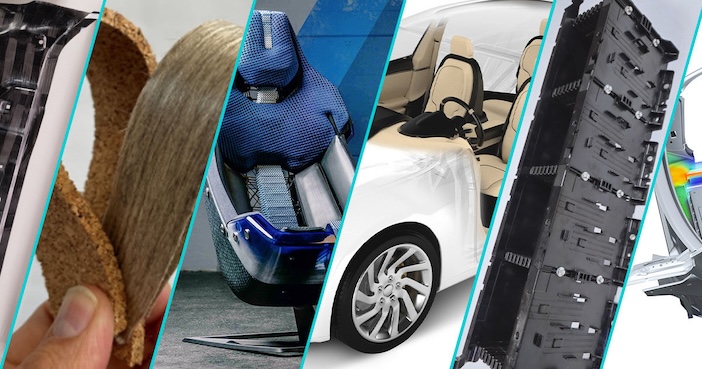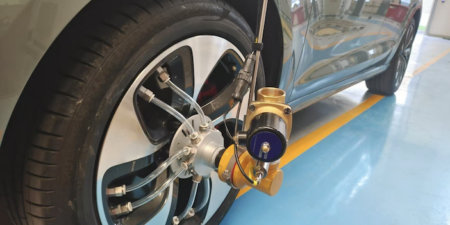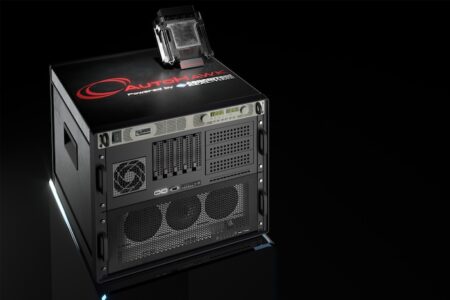Altair, a company working in computational intelligence for simulation, high-performance computing (HPC), data analytics and AI, has crowned the winners of its 2024 Altair Enlighten Awards. The awards, presented in association with the Center for Automotive Research (CAR), recognise sustainability and lightweighting advancements that can help reduce the automotive sector’s carbon footprint, mitigate water and energy consumption, and leverage material reuse and recycling efforts.
The winners:
Enabling Technology
Winner: CompositeEdge GmbH – Next-Gen Sustainable High-Performance Structures
With the aim of minimising overall material usage, CompositeEdge GmbH is using natural fibre composites such as flax and hemp fibre, blended with plastic to form high-performance structures that can support the automated manufacture of chassis parts, suspension elements, car body panels, interior trims and more without additional adhesives. The company says the use of natural fibre composites significantly reduces carbon emissions and energy consumption compared with the use of synthetic materials. Overall, the technology enables the production of sustainable, lightweight automotive components.
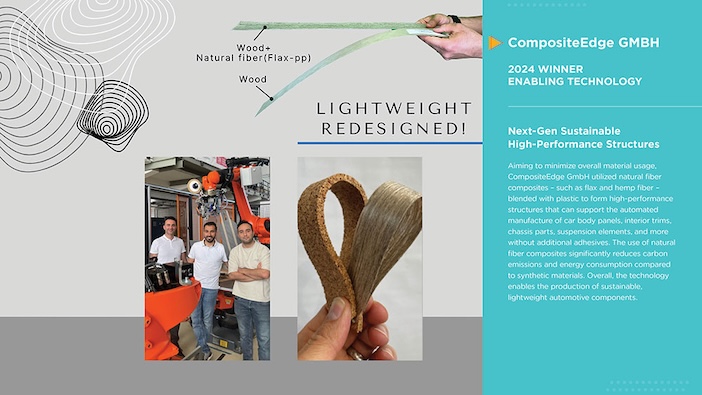
Runner-up: Teijin Automotive Technologies – Fully Automated Preforming Process Enabling Complex CFRP Part
Teijin Automotive Technologies’ fully automated preforming process enables the mass production of carbon fibre preforms for use in automotive components – in this case a vehicle door. The precision of the automated process optimises the amount of material used and recycles waste by a small amount. Teijin says the previous labour-intensive process was unsuitable for mass production and often resulted in avoidable waste due to human error. The new process is more efficient, reducing the labour required by 20%.
Honourable Mention: Bemis Manufacturing Company and BASF Corporation – Large Hydraulic Tanks for Compact Excavators via BASF’s Ultramid Polyamide
Bemis Manufacturing Company and BASF Corporation have developed large hydraulic tanks for compact excavators using BASF’s polyamide, which delivers both environmental savings (reductions in life cycle CO2 emissions) and reduced life cycle cost. In addition, by combining injection moulding and vibration welding, the approach resulted in 5% mass savings and 20% lower costs compared with traditional roto-molding.
Future of Lightweighting
Winner: WEAV3D, Braskem, and Clemson Composites Center – Cost-Effective Lightweight Vehicle Body Structures
WEAV3D, Braskem, and the Clemson Composites Center have developed a composite lattice-reinforced polypropylene sheet that is tailorable to match the performance of any vehicle body structure on the market. Manufactured with a high rate, highly automated forming cycle that produces more parts using less energy, the new sheet cost 50% less and weighs 23% less than CFPA6 organosheet (nylon 6) and weighs between 60-70% less than steel. The material also boasts a 62% reduction in trim scrap by weight. Lastly, compared to steel, the polypropylene sheet features superior energy absorption and shape recovery.
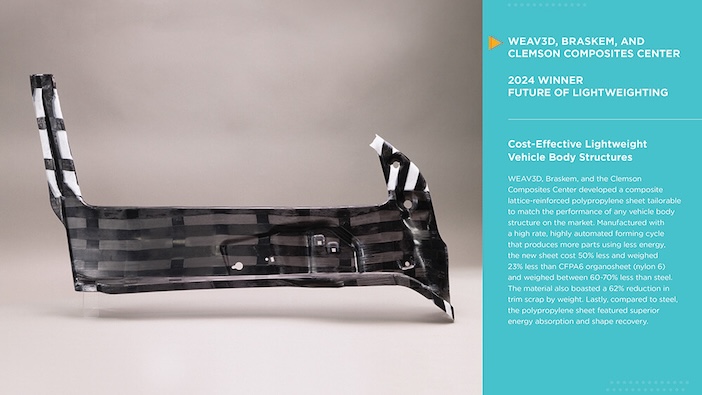
Runner-up: Carsolia Composites Corporation – Composite Suspension Coil Spring
Carsolia Composites Corporation has introduced a composite coil spring claimed to be 50% lighter in weight than steel. The carbon fibre composite material also has 50% less CO2 equivalent per kilogram than steel, resulting in a 75% overall reduction of CO2 emissions. Manufactured with an efficient production process that supports high-volume vehicle production, the spring also enables new appearance design possibilities. Ideally suited for battery electric vehicle (BEV) platforms, the coil spring can be used a direct replacement for current vehicles as a ‘bolt-on solution’, with no redesign needed.
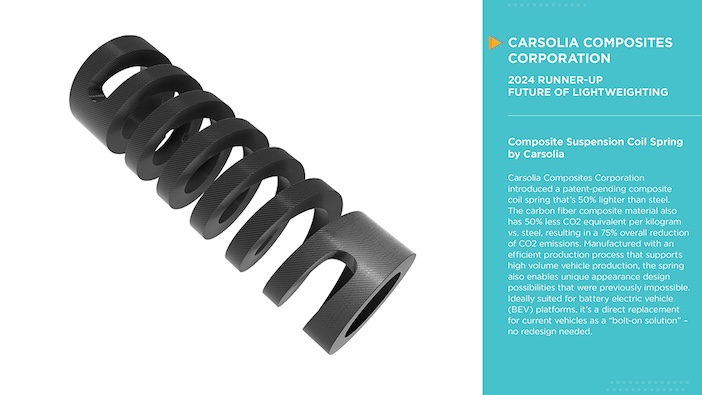
Sustainable Product
Winner: DuPont Betamate Broad Bake Adhesive Technology
DuPont’s Betamate broad bake adhesive technology is designed to help reduce energy use and greenhouse gas emissions during vehicle body manufacturing by allowing adhesives to cure at lower temperatures, thus saving energy via reduced e-coat oven temperatures and shorter oven cycle times. The technology is also claimed to eliminate the need for cold storage due to a formulation that extends shelf life.
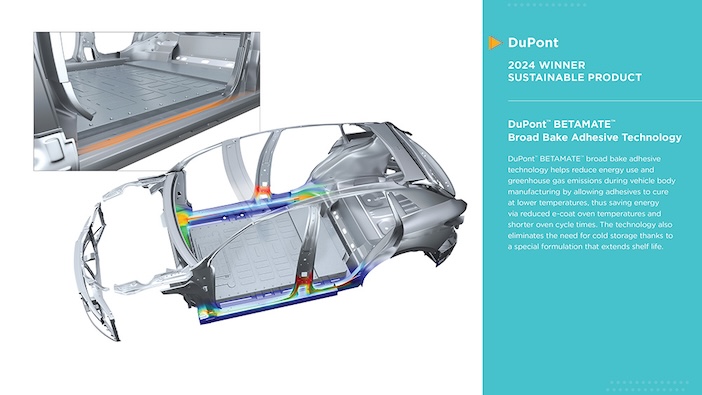
Runner-up: Bridgestone Americas Turanza EV Tyre
The Turanza EV grand touring tyre is manufactured with 50% renewable and recycled materials – one of the highest percentages to be found among commercially available replacement tyres – and features Bridgestone Enliten technology to optimise performance and improve the life span of the tyre. By 2050, Bridgestone is aiming for all of its tyres to be composed of 100% renewable and recycled materials.
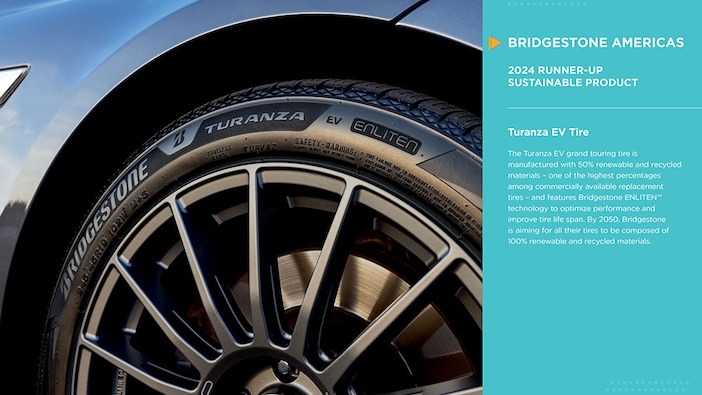
Sustainable Process
Winner: BMW M GmbH, AMC GmbH, Bcomp, Gradel Lightweight, and Lasso Ingenieurgesellschaft – BMW M Visionary Materials Seat
The BMW M Visionary Materials Seat focuses on circular design principles and sustainable materials. The seat features a monomaterial lightweight design that uses sustainable, renewable materials such as recycled polyester textile, flaxfiber BioComposite, and biogene leather alternatives. Where possible, petrol-based raw materials through bio-based materials were made from algaes and plant-based fillers such as chalk and cork. The composite can be made from carbon, basalt, glass fibre or natural fibres, as needed.
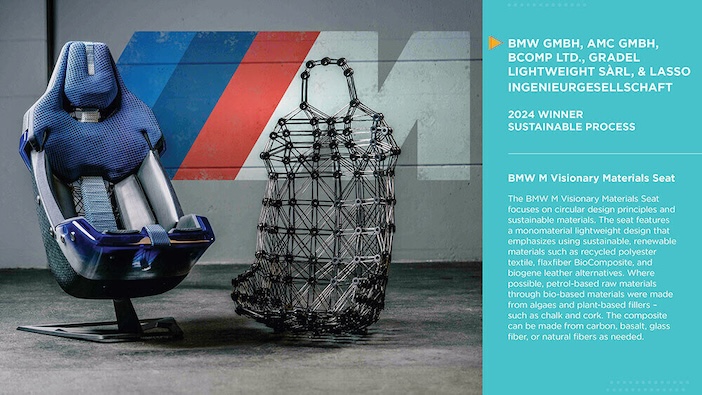
Runner-up: Toyota Motor Manufacturing Canada and PPG Industries – EPIC200X Electrocoat
The EPIC200X electrocoat enhances corrosion protection for automotive bodies while reducing environmental impact. At Toyota’s Canada facility, the new product and application process enables a total reduction of 3,500 metric tons of CO2 emissions per year. More specifically, the new product reduces the amount of applied product by vehicle by 0.6kg, while the new application process saves 5,626,000kWh of energy and 1,843,000 gallons of water per year.
Module Lightweighting
Winner: Syensqo and General Motors – High-Performance Thermoplastic Battery Module Structure
Syensqo and General Motors have collaboratively designed a high-performance thermoplastic battery module structure that delivers a 37% weight reduction and 25% cost savings compared to aluminium. Key features include enhanced vehicle performance through precision injection moulding, streamlined component consolidation for simplified assembly, and a unique cell-lock feature that stabilises battery cells. The design also eliminates multiple components and processes, further optimising efficiency.
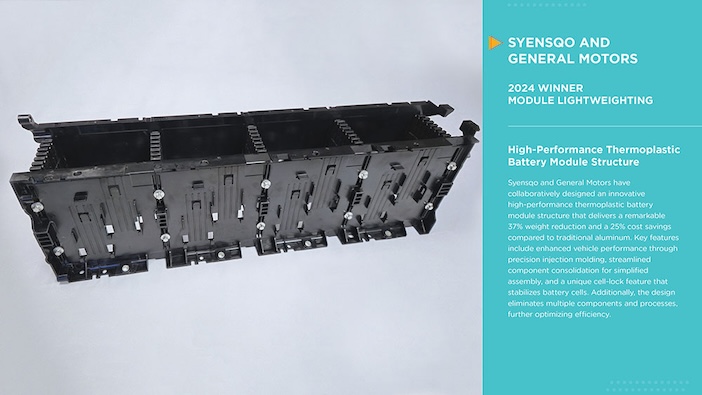
Runner-up: Toyota Motor Company, US Farathane, and BASF Corporation – Toyota Tacoma Second-Row Composite Seat Structure
The Toyota Tacoma Second Row Comprise Seat Structure features 30% less mass than the previous generation of steel seats for the vehicle, and 20% less mass than the current resin seats seen in the 2022 Toyota Tundra. In addition, the new seat structure consolidates more than 55 parts into just four parts that take little time to be injection moulded and shipped.
Responsible AI
Winner: Dow Inc. – Sustainable SpecFlex Polyurethane Solutions
Dow Inc.’s SpecFlex polyurethanes focus on developing and using cleaner raw materials and unique design principles to optimise performance. Dow says the material achieves equivalent mechanical and ageing properties compared with traditional formulations, and is significantly safer and more sustainable – with over 50% lower total volatile organic compounds (VOCs), 60% lower formaldehyde, and 80% lower acetaldehyde.
Moreover, an AI aldehyde predictive model can accelerate market response by capturing the factors contributing to odour and translating complicated non-linear features into real-world related performance features – enabling outcome prediction.
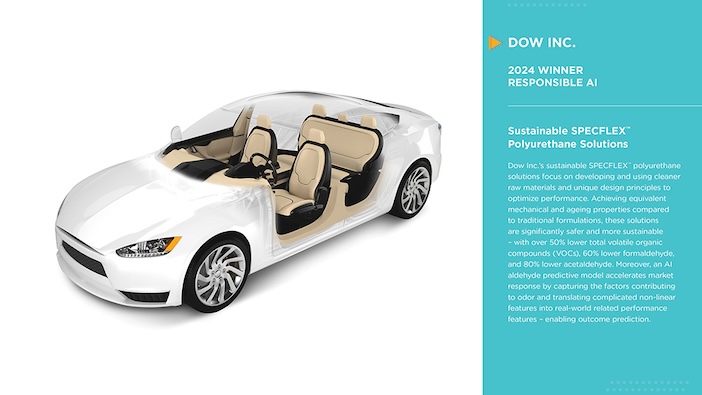
“The Enlighten Award is the leading award highlighting the automotive industry’s finest innovations in sustainable technology. We are thrilled to once again recognise the organisations creating a more sustainable future,” said James R. Scapa, founder and chief executive officer of Altair. “This year’s winners can consider themselves the best innovators meeting those challenging targets.”


